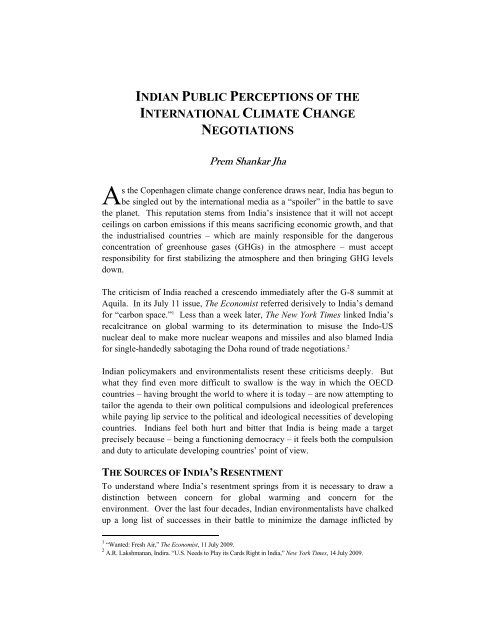Indian Climate Policy - Global Commons Institute
Indian Climate Policy - Global Commons Institute
Indian Climate Policy - Global Commons Institute
Create successful ePaper yourself
Turn your PDF publications into a flip-book with our unique Google optimized e-Paper software.
INDIAN PUBLIC PERCEPTIONS | 31<br />
INDIAN PUBLIC PERCEPTIONS OF THE<br />
INTERNATIONAL CLIMATE CHANGE<br />
NEGOTIATIONS<br />
A<br />
Prem Shankar Jha<br />
s the Copenhagen climate change conference draws near, India has begun to<br />
be singled out by the international media as a “spoiler” in the battle to save<br />
the planet. This reputation stems from India’s insistence that it will not accept<br />
ceilings on carbon emissions if this means sacrificing economic growth, and that<br />
the industrialised countries – which are mainly responsible for the dangerous<br />
concentration of greenhouse gases (GHGs) in the atmosphere – must accept<br />
responsibility for first stabilizing the atmosphere and then bringing GHG levels<br />
down.<br />
The criticism of India reached a crescendo immediately after the G-8 summit at<br />
Aquila. In its July 11 issue, The Economist referred derisively to India’s demand<br />
for “carbon space.” 1 Less than a week later, The New York Times linked India’s<br />
recalcitrance on global warming to its determination to misuse the Indo-US<br />
nuclear deal to make more nuclear weapons and missiles and also blamed India<br />
for single-handedly sabotaging the Doha round of trade negotiations. 2<br />
<strong>Indian</strong> policymakers and environmentalists resent these criticisms deeply. But<br />
what they find even more difficult to swallow is the way in which the OECD<br />
countries – having brought the world to where it is today – are now attempting to<br />
tailor the agenda to their own political compulsions and ideological preferences<br />
while paying lip service to the political and ideological necessities of developing<br />
countries. <strong>Indian</strong>s feel both hurt and bitter that India is being made a target<br />
precisely because – being a functioning democracy – it feels both the compulsion<br />
and duty to articulate developing countries’ point of view.<br />
THE SOURCES OF INDIA’S RESENTMENT<br />
To understand where India’s resentment springs from it is necessary to draw a<br />
distinction between concern for global warming and concern for the<br />
environment. Over the last four decades, <strong>Indian</strong> environmentalists have chalked<br />
up a long list of successes in their battle to minimize the damage inflicted by<br />
1 “Wanted: Fresh Air,” The Economist, 11 July 2009.<br />
2 A.R. Lakshmanan, Indira. “U.S. Needs to Play its Cards Right in India,” New York Times, 14 July 2009.
















